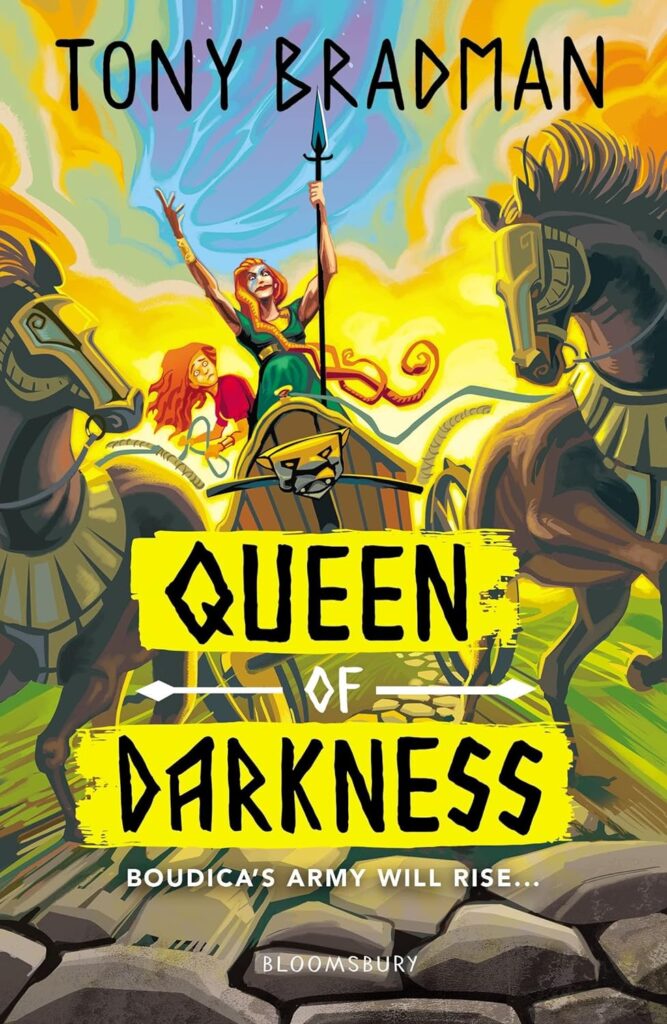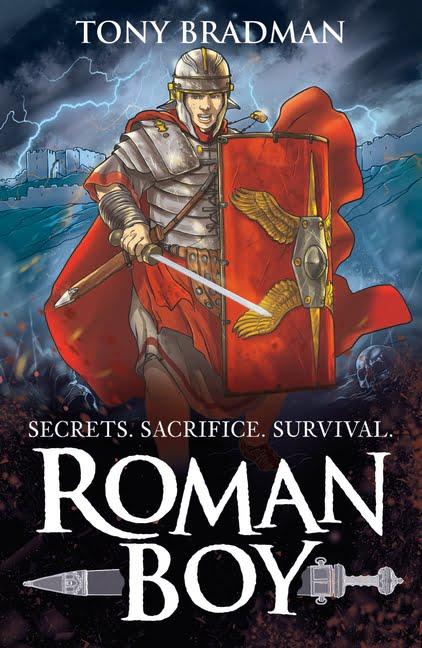Tony Bradman joins Sarah Farrell in The Reading Realm today to talk about his fascinating, gripping and thrilling book QUEEN OF DARKNESS!
Without giving too much away can you tell us a bit about your book Queen of Darkness?
It’s the story of a young girl called Rhianna and it’s set in the early years of Roman Britain. Rhianna is part of the great Iceni tribe, and they lived in the county we now call Norfolk. The most famous queen of the Iceni was Boudica, of course, and in Queen of Darkness Rhianna finds herself swept up into Boudica’s rebellion against the Romans. Rhianna gets to know Boudica very well, and discovers that there’s a very dark side to the Queen. Rhianna also has to protect her little sister Eleri from the terrible things that happen around them…

I really liked that Queen of Darkness had so many strong female characters. Where did the inspiration for the characters of Garwen and Rhianna come from?
I did a schools webinar about my books for the Historical Association a couple of years ago, and two girls took me to task for only writing books with boys as lead characters! I have written several stories with girls as lead characters, but they did have a point – over recent years I’ve written Viking Boy, Anglo-Saxon Boy, The Boy and the Globe, Anzac Boys etc… I also thought it was time I tackled the subject of Boudica – I’ve always been fascinated by Rome and its impact on these islands and that story is an essential part of it. Over the years I’ve also done a lot of reading about the ancient world, and I was always interested by the idea that there were many societies in which women ruled, usually through a matriarchal religion – the ‘Mother Goddess’. The recurrence of the idea of the three sisters, the fates in ancient Greek religion as as well in the Viking myths, seems to support that. So it wasn’t a big leap from there to seeing the Boudican revolt as a conflict between a society ruled by matriarchal religion and the patriarchal approach of the Romans – and they really were very patriarchal indeed. All I needed to do then was to come up with a young character who is vulnerable, but strong and determined too – and that’s Rhianna. I also thought that a tough Queen in matriarchal society would have a bodyguard of tough Amazon-like women warriors, hence Garwen. She was a lot of fun to write – very cool!
What is it about writing historical fiction that appeals to you?
I love doing the research, both in terms of reading and visiting interesting places – I’m a sucker for a good ruin, and also for an expensive academic book about something very obscure! I loved history when I was at school, but I also loved reading great historical fiction by writers such as Rosemary Sutcliff and Henry Treece. The books that really turned me into a reader were those of Tolkien, The Hobbit and the Lord of the Rings – they’re fantasy, but they’re built on a deep understanding of and love for the myths and legends of the Vikings and Saxons, so there’s almost a historical side to them too… I suppose ultimately it’s all about the stories – history offers a vast range of potential stories, characters facing huge problems, jeopardy at every turn, loads of conflict. For a writer that’s wonderful – you don’t have to sit around scratching your head trying to come up with something totally new! And in children’s books, if you get it right you can not only give young readers a gripping read, you can also help them understand about the past and how it might have led to the way we are today.

In the opening chapter of Queen of Darkness, you mention that Rhianna has vibrant red hair and blue eyes while Eleri has black hair and brown eyes. Why did you decide to have Rhianna physically resembling Boudica more than she resembled Eleri?
Simple, really – it reveals a lot about Boudica… She really is a bit of a narcissist, and it’s the fact that Rhianna looks a bit like her that makes her interested. She sees herself in Rhianna, who is initially flattered. But Rhianna’s journey in the story will reveal that she and Boudica are very different in the ways they see the world…
Which three words would you use to describe the character of Boudica?
Dark. Powerful. Scary.
The theme of vengeance runs through the book, and there are many battle scenes! Is it hard to write about death and destruction in a way that is suitable for younger readers?
I have thought about this issue a lot over the last few years. Most of the historical fiction I’ve written is set in periods of real conflict and war, so if you want to tell the stories properly you will at some point have to write about violence. It’s the conflict that generates the danger and the drama… and it’s a simple truth that people (ie men!) have always been violent in one way or another – it seems to be part of our nature as human beings (altruism is too – we’re very complicated!). I believe the secret to writing about it well, especially for young readers, is not to glorify it or dwell on the gore in the way that a lot of films and video games seem to. So if there’s violence in one of my stories, I make sure that we see the devastating effect it has on its victims and the people who love them, whether that’s a battle between the Romans and the Iceni, or a Luftwaffe raid on London (as in my world war two book for Scholastic, Blackout). I spend a lot of time working on those bits of my stories – I’m very aware of my responsibilities in that area!
The character of Boudica becomes darker throughout the book. How did you go about creating her character from historical sources?
There’s very little! A page or so in Tacitus, but that of course is the view of the Romans, and they really didn’t like her. I took the core element of that, which is really about how tough they thought she was (and strangely enough, the Romans were very impressed by tough, war-like women!), and then thought about what the archaeological record shows – Boudica does really seem to have burnt down three Roman cities and put a lot of people to death, which probably says quite a lot about her. As we say in south London, I wouldn’t have argued with her…
Rhianna and Eleri have a very lucky escape! Was the book always destined to end the way it did, or did you consider a less fortuitous ending?
I have to confess that I always wanted Rhianna to succeed! Of course it could have ended in a different way, but that might have been very dark and tragic, and I didn’t want that.
Many of your books are closely linked to the primary history curriculum, which is great for schools! How do you see Queen of Darkness being used in schools?
First and foremost I want children to enjoy it as a gripping story full of interesting characters! I’m a real believe in the importance of reading for pleasure – I always tell kids that reading for pleasure is like magic. The more you do it, the cleverer and more knowledgable about all sorts of things (including people!) you’ll be. But I know that schools also use my books to help children in their school work, so I imagine that teachers will be able to use Queen of Darkness to explore the history of Roman Britain. I work very hard to make my books as accurate as possible, so there are lots of aspects to look at in class – i.e., who were the Britons, what were their customs and religions and societies like, what language did they speak (an early form of Welsh!), and of course all the same questions can be asked about the Romans. I’m also very keen to show in my work that people have always come to these islands from elsewhere – the Romans were invaders who stayed for 400 years, so their DNA is part of our history. There’s also the whole aspect of war and what it does to people – in recent years children will have been aware of the wars in the middle east and how people have fled their homes to survive – that also happened in Britain when Boudica and Rhianna lived. I should perhaps add that I’m always happy to be contacted by teachers (best via Twitter or my website!) and answer any questions about my books that children might have, and generally talk about my love of history and historical fiction. I also offer free Skype sessions of up to an hour…


Your books cover a range of different historical eras. Do you have a particular favourite that you like to write about?
I love every historical period I’ve written about! Once you get into them they’re all fascinating. My books have focused on specific curriculum periods because that’s what publishers want – it’s easier for them to sell books about those periods to schools than it would be to sell books set in non-curriculum periods. That’s why you don’t see many books about the later middle ages, ie the Plantagenets and the Wars of the Roses, or the 17th century… I’d certainly like to write a story set in the Civil War – it hardly gets a mention but to a large extent it made Britain what it is today.
How would you summarise Queen of Darkness in one sentence?
It’s the story of how one girl survives and protects her little sister in one of the darkest, most violent periods of British history.

